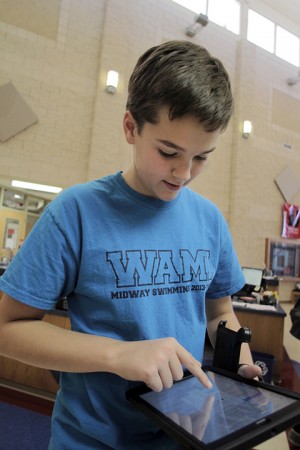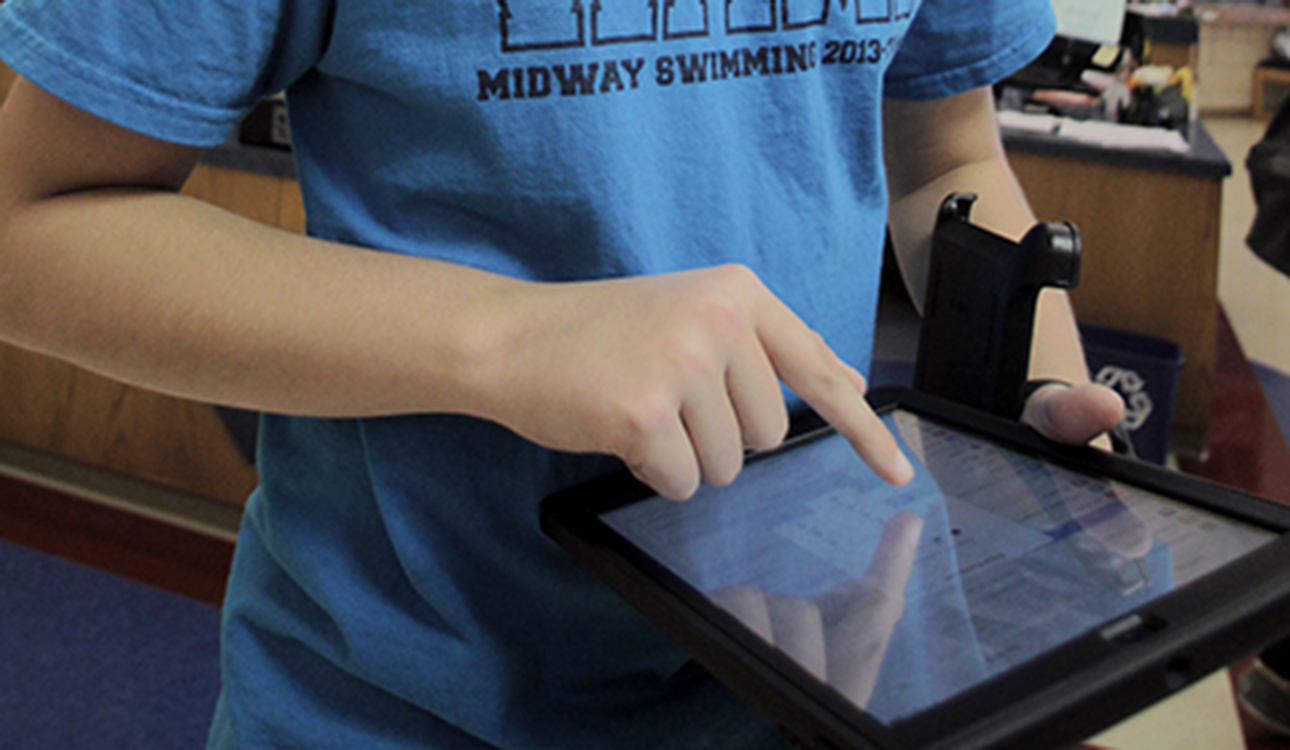
Travis Taylor | Lariat Photo Editor
By Rebecca Fiedler
Staff Writer
Midway Independent School District is changing the way its students learn by issuing an Apple iPad to each child in kindergarten through 12th grade. The introduction of these devices into students’ hands is a point of contention for some people, and the district is attempting to address the issues.
Last year Midway ISD administrators and faculty tested iPad usage with elementary students, which is a part of the technology-incorporated learning plan, the 1:1 Initiative. An iPad model 2 was given to each student at Speegleville Elementary School. Traci Marlin, public information coordinator for Midway ISD, said the study of iPad usage at Speegleville showed positive results with students’ grades.
During that year, Speegleville ranked #1 in performance improvement for its state peer group, which compared the school to 40 other schools in the state that are similar in size and demographic.
“Midway does not believe that iPads are magic, but that they’re tools with endless possibilities,” Marlin said.
The funding for the iPads being distributed to all Midway students comes from a bond voted upon by taxpayers in May 2013. For Midway’s implementation of the 1:1 Initiative, $5 million of the $34.5 million bond will be used on iPads and other technology, such as updated Wi-Fi, servers, apps and Otterbox cases.
“Essentially, we’ve asked our taxpayers for permission to spend local tax funds on projects,” Marlin said. “It can be a tax increase, but it’s not necessarily a tax increase.”
Marlin said she compares the bond to a home loan or mortgage, where the school district can use the money up front, and then it will be paid back over time.
“In this case, we did not actually have to raise taxes to pay it back over time because the amount we’re getting from taxpayers each year is enough to pay back the bond,” she said.
Marlin said she projects the $5 million will be paid off in five years.
Dr. Brooke Blevins, assistant professor of curriculum and instruction at Baylor, said the integration of modern technology into schools is happening around the country, and that there have always been initiatives to have technology in school.
“I think there are benefits and downfalls,” Blevins said. “One benefit I see is that today students are digital natives.”
Blevins said teachers are now having to learn how to work with a generation of students who are accustomed to the use of digital technology.
“It is the reality of students’ lives,” Blevins said. “So to ignore that in classrooms, I think, is problematic.”
Some parents of Midway students have expressed their concerns about a $250 fee that students’ families will be required to pay if an iPad is broken or stolen.
Marlin said, however, students are already responsible for paying for textbooks, musical instruments, sports equipment and other school property if damaged.
“It’s not brand new for our students to be responsible for hundreds of dollars of school district property,” she said.
For students from low-income families, Midway officials have been discussing how to handle the situation should an iPad break and one of these students owe $250. Marlin said the officials are still trying to decide what they would do, but they aren’t anticipating many problems with breakage.
Some other districts have required students to pay user fees or have mandatory insurance with their iPads, so those are things Midway is taking into consideration, Marlin said.
“We are reserving the right to require a user fee in the future, but we are not doing it this spring,” she said. “If there’s no breakage, and no damage that we can’t repair and handle, then we wouldn’t necessarily have to initiate fees in the future.”
Right now parents have the option of acquiring private insurance for their child’s iPad.
Midway has also introduced procedures for handling iPads, where students must keep two points of contact at all times when holding iPads.
There has been little theft at other campuses and no cases of theft at Speegleville so far, Marlin said.
Other schools in Texas have already begun using iPads, and staff from Midway ISD have interviewed school officials and visited the campuses to evaluate the student usage of iPads in curricula. Marlin said observations at other schools have shown Midway officials that students tend to be responsible with the technology. At Speegleville Elementary, almost 300 iPads were issued and only two broke, Marlin said. One of those belonged to a staff member. Both iPads were able to be repaired in-house with the school’s own technology department.
“So we’re basing our expectations off of what these other schools have seen as well,” Marlin said.
Sophie Tullos, a freshman at Midway High School, said she is only somewhat excited about getting her iPad and is concerned she may accidentally break it.
“I have a tendency to be clumsy about things, so I’m slightly worried about that,” Tullos said.
Tullos said she already has a Kindle tablet and iPad at home, so she doesn’t feel she’ll use the Midway-issued iPad at home. She said she does expect that using the iPad in class will be fun, but isn’t sure if Midway ISD purchasing the iPads is a good thing.
“It’s a lot of money, and not necessarily everybody wants it,” Tullos said. “None of my friends are really excited about it.”
Other students are happy about the new technology. Quinn McGinty, also a freshman at Midway High School, said he is very excited about receiving his iPad.
“I think it will be really good for education,” he said. “Some stuff is meant to stay with paper, but I think this is going to help a lot.”
Michele Giroir, the mother of a senior at Midway High School, said her concern with the iPads is that the Otterbox cases do not cover the glass screen, only the back of the iPad.
“They’ll have to be careful with them,” she said.
Overall, Giroir said she thinks the iPads are a good idea for the district.
“I think it will be good in the long run because it’s just how kids learn these days,” she said. “I think it will hold their attention more. I think it would be great in the long run if it would replace their textbooks.”
Middle and high school students may take iPads home with them during the school year for use, while elementary and intermediate school students may only use the iPads in the classroom. Monday, iPads began to be distributed to the high school students and next week, the middle school will begin to receive them. The order will then progress downward through the grade levels.
The iPads used at Speegleville are the iPad 2 model. These will be taken and given to the kindergartners and first-grade students, while second through 12 grade students will receive the iPad Air model. Marlin said iPad Airs are better for science applications and work faster with Wi-Fi and downloading.
Marilin said Apple’s updates to its models of iPad have been a major topic discussed by Midway officials.
Marlin also said using the iPad Air will give the iPads an expected four to five years of use until they will need to be replaced, Marlin said.
Midway ISD school principals have set different expectations on how the iPads are to be used at different grade levels. The iPad is a tool for teachers to use, but there is not any mandatory expectation of constant use in the classroom, Marlin said. It is up to the teachers to plan their lessons and how they will integrate the iPads.
“At this point, it isn’t about replacing the textbook,” Marlin said.
Marlin said e-textbooks, if used, should be something that downloads on an iPad and are usable without the internet. Students have the option to go to a local library with Wi-Fi or around campus for special projects requiring internet usage outside class, she said.






